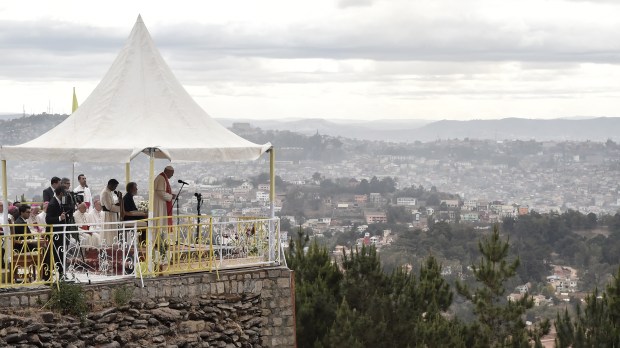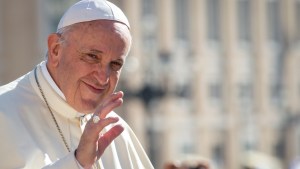Drawing from Jesus’ invitation to rest in today’s Gospel, Pope Francis offered a reflection on what it means to truly rest, and why it is so necessary, even for our productivity.
The Pope said there is a constant danger tempting us:
the danger to be caught up in the frenzy of doing things, to fall into the trap of activism where what is most important are the results that we obtain and the feeling of being absolute protagonists.
“Let us learn how to take a break, to turn off the mobile phone, to contemplate nature, to regenerate ourselves in dialogue with God,” the Holy Father urged.
Paradoxically, he said, it is this ability to rest that enables us, like Jesus, to have compassion.
In fact, only a heart that does not allow itself to be taken over by hastiness is capable of being moved; that is, of not allowing itself to be caught up in itself and by things to do, and is aware of others, of their wounds, their needs.
Here is the full text of the Pope’s brief reflection before praying the midday Angelus.
~
Jesus’s attitude that we observe in the Gospel of today’s liturgy (Mk 6:30-34) helps us to grasp two important aspects of life. The first is rest. To the Apostles returning from the labours of the mission who enthusiastically begin to relate everything they had done, Jesus tenderly directs this invitation to the Apostles: “Come away by yourselves to a lonely place, and rest a while” (v. 31). An invitation to rest.
In so doing, Jesus gives us a valuable teaching. Even though he rejoices on seeing his disciples’ happiness due to the wonders of their preaching, he does not spend time giving them compliments or asking questions. Rather, he is concerned about their physical and interior tiredness. And why does he do this? Because he wants to make them aware of a danger that is always lurking there for us too: the danger to be caught up in the frenzy of doing things, to fall into the trap of activism where what is most important are the results that we obtain and the feeling of being absolute protagonists. How many times this happens in the Church: we are busy, we run around, we think that everything depends on us and, in the end, we risk neglecting Jesus and we always make ourselves the centre. This is why He invites His disciples to rest a bit with Him on their own. It is not only physical rest, but also rest for the heart. For it is not enough to “unplug” ourselves, we need to truly rest. And how do we do this? To do so, we must return to the heart of things: to stop, to remain in silence, to pray so as not to go from the frenzy of work to the frenzy of times of relaxation. Jesus did not neglect the needs of the crowd, but each day, before anything else, he would withdraw in prayer, in silence, in intimacy with the Father. His tender invitation – rest a while – should accompany us. Let us beware, brothers and sisters, of efficiency, let us put a halt to the frantic running around dictated by our agendas. Let us learn how to take a break, to turn off the mobile phone, to contemplate nature, to regenerate ourselves in dialogue with God.
Nonetheless, the Gospel tells us that Jesus and his disciples could not rest as they had wished. The people find them and flock to them from all sides. At which point, he is moved with compassion. This is the second aspect: compassion, which is God’s style. God’s style is to draw near, compassion and tenderness. How many times we find this phrase in the Gospel, in the Bible: “He had compassion on them”. Touched, Jesus dedicates himself to the people and begins to teach again (cf. vv. 33-34). This seems to be a contradiction, but in reality, it is not. In fact, only a heart that does not allow itself to be taken over by hastiness is capable of being moved; that is, of not allowing itself to be caught up in itself and by things to do, and is aware of others, of their wounds, their needs. Compassion is born from contemplation. If we learn to truly rest, we become capable of true compassion; if we cultivate a contemplative outlook, we will carry out our activities without that rapacious attitude of those who want to possess and consume everything; if we stay in touch with the Lord and do not anesthetise the deepest part of ourselves, the things to do will not have the power to cause us to get winded or devour us. We need – listen to this – we need an “ecology of the heart”, that is made up of rest, contemplation and compassion. Let us take advantage of the summer time for this! It will help us quite a bit.
And now, let us pray to the Madonna, who cultivated silence, prayer and contemplation and who is always moved with tender compassion for us, her children.



